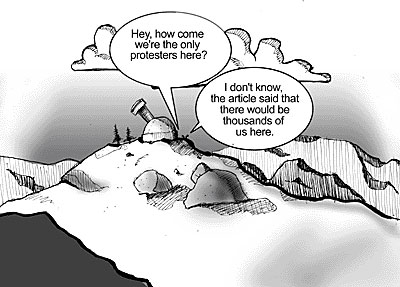
Illustration by Arnie Bermudez
|
|
By Jessica Lee
Arizona Daily Wildcat
Tuesday, December 9, 2003
Print this
Most everyone has the desire be a "good" person. But what does that mean? What does it take to be good and what qualifies as good?
Currently Philosophy 323, Environmental Ethics, is debating this very issue. After spending the semester engaged in essays that challenge the global human community as to how it ought to live with respect to the natural environment, the instructor pressed the class with a single question: "Should the university force students to take environmental ethics by requiring the course for their graduation?"
As the semester winds down, students often find time to reflect on the year and the entire college experience. While universities now only seem like businesses where people put up money to receive a degree, our time here at this public land-grant university is obviously more than that. We as students have opted to subject ourselves to the process of becoming educated members of society.
It used to be that when a student was ready to graduate, the student's faculty members would gather and discuss whether the student was qualified. Sure, they would make sure the student had completed all the university's requirements, but the group had something more to determine. They would debate whether the student was "educated" enough to graduate.
 |
|
Jessica Lee
Associate editor
|
|
|
What does it mean to be considered "educated?" And what do we owe society and ourselves with our acquired knowledge? How should we, as college-educated people, choose to live our lives? Philosophical doctrine long ago gave the world ethics, the intellectual tools necessary to weigh life - in all its splendor and consequences - to decide the best way to spend our days as human beings.
On Saturday, the Arizona-Sonora Desert Museum presented "Last Stand: America's Virgin Lands," a slide show and essay reading based on a book by photographer Annie Griffiths Bell and local gem of an author Barbara Kingsolver. The book attempts to capture the last 1 percent of the United States that has remained pristine in an effort to communicate the essence of why we must protect what hasn't yet been altered by man. The powerful female duo took up the project because they could no longer just do nothing. Self-declared social recluses Kingsolver and Bell pushed themselves into the public light once again in the attempt to inspire Americans to do what must be done.
We must set aside the grind of our daily lives as citizens of the most educated and richest nation on earth and turn our attention inward, into the heart of America: Wilderness. And the fight to save what is left.
The Last Stand Trust has been established through the National Geographic Society as a means to raise money to support grassroots-level environmental action, to financially assist everyday people who have made the choice to let ethical considerations govern the way they live their lives.
Face it: We are all environmental hypocrites. We want cleaner air, but vote down an attempt at a comprehensive Tucson transportation plan. Recycling is a good idea, but we are too lazy to walk an aluminum can to the bin across the UA Mall. We know that most plastic is not biodegradable, but we allow Pei Wei to pack our takeout order with an unnecessary number of bags. We support minimizing our impact on the environment, but continuously buy and throw away endless amounts of material junk.
Unless you live alone in the middle of nowhere, you make dozens of choices each day that affect our natural resources and wild places. Ignorance combined with perpetual consumer spending affects forest clear-cutting, destructive mining, over-fishing, endangered animal slaughtering and ruthless pollution. Thus, if you value environmental health and the protection of our most sacred natural places, you must take it upon yourself to critically evaluate the daily decisions you make. If you value these things but do not live in a manner that supports these values, then you must become comfortable with being an unethical person.
If you value protection of our wild landscape and more sustainable natural resource management, then you have no choice but to realign your life to those values. The present is the best time to scale down and minimize your own personal negative impact on the things you intrinsically value. It has been proven that the current Bush administration has, in the words of Kingsolver, placed priority in "the economy of the moment over the economy of forever." If the Bush regime is allowed to continue liquefying the resources that belong to the American people, we will have nothing left.
We only have 11 months to do something about it. American grassroots must continue the vision of John Muir, Henry David Thoreau, Rachel Carson, Joseph Wood Krutch, Aldo Leopold and Edward Abbey. Students must be the catalysts of change in this country. It is time for an environmental ethics revolution.
Jessica Lee is an environmental science senior. She can be reached at letters@wildcat.arizona.edu.
